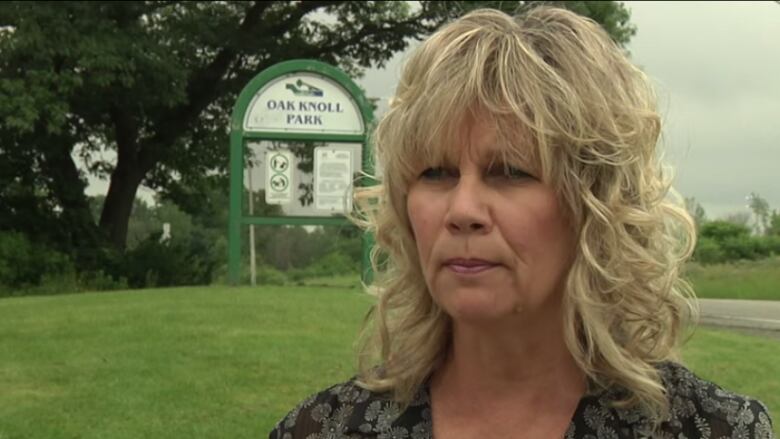As illegal dumping hits Hamilton parks, councillor wants more surveillance
Coun. Sam Merulla to propose permanent surveillance in city parks where dumping happens frequently

East end councillor Sam Merulla wants to see video cameras permanently installed at Hamiltonparks as the next step in the city's battle against illegal dumping.
Merulla will call for a report on the feasibility of doing so in a motion going to councilWednesday.
A pilot project meant to deter illegal dumping has been in place since 2012. Merulla said the city has now experienced a "shift" from railway tracks and private properties to city parks, like Windermere Basin, where a dump of plastic wiring recently entangled and killed some birds. However, the city staff running the illegal dumping project attribute the increased incidences in parks to their increased proactivefocus there.
- Illegal dumping at Hamilton's Devil's Punchbowl
- City weighs spending another $165K on illegal dumping
But whether illegal dumping in parks is increasing because of enforcement elsewhere or is just being uncovered by a new enforcement focus, it is happening.
And Merulla is clear what he believes about the issue.
"It is aconsistent and very predictable problem that is escalating rather than improving," Merulla said. "It is a crisis throughout the city. As a direct result we areaggressively pursuing surveillanceto ensure people arent thinking that the city is their garbage can."
Thecity's illegal dumping project has used video surveillance in places to help identify offenders and in some cases bring charges with a maximum fine of $10,000.
The question is how much morecouldvebeen dumped.- Coun. Sam Merulla, Ward 4
The city received 1,750 complaints in 2012 and1,950 complaints in 2013for dumping on city and private companies. That number dropped in 2014 to1,600 complaints.
A staff report in May touted the pilot project as a success, saying even though complaints rose between 2012 and 2013, the project had "cleared up" nearly all of the hot spots the council had identified.
But on top of those complaintsthe city team responded to in 2013, they logged 7,500 checks at city parks in the same year some of them proactive checks and some responding to complaints. When the staff looked at the incidences of dumping, they noticed a spike in parks between March and July that is so far unexplained. This year the team conducted 6,800 proactive investigations in parks.
"The shift is more a shift in where we're focusing our effort," said Kelly Barnett in the city's Municipal Bylaw Enforcement department. She said the city is applying a higher level of enforcement in parks under the pilot project and is waiting for the final 2014 statistics to see whether the summer spike is a trend.
The project has led to more than 100 charges of illegal dumping, with more than 55 of those happening this year, Barnett said.
'Easy access for people to come and go unseen'
Barnett said parks are especially hit when they are "close to highways, easy access for people to come and go unseen."
Merulla mentioned Windermere Basin, Globe Park, the Mohawk Sports Park, Olympic Sports Park andagricultural land and parkland as places he's especially concerned about. Coun. Tom Jackson, who supports Merulla's measure to study making the surveillance permanent, added the escarpment, the rail trail and Albion Falls to the list of parkland hot spots.
"We must severely fine and penalize the very small minority of renegades who just disregard and dont care about the beautification and cleanliness of our city," Jackson said.
Merulla said he and city staff are not saying the focus on some areas of the city is just driving the dumping elsewhere, to parks.
"Its not as if people are driving down to the railway, seeing surveillance and then going to dump in a park," he said. "If thats the case were not really providing professional surveillance."
He also said the examples like theWindermerewiring dump and others in parks are not evidence the program isn't working.
"The question is how much more couldve been dumped," he said. The surveillance "could have very well have mitigated dumping that would have happened."
Barnett said if directed at city council Wednesday, her team will look into the feasibility of applying surveillance to a greater number of parks.
"Cameras do have their use if there's enough evidence that could help us bring charges," she said. "You're looking at a fairly expensive camera to be able to capture the kind of informationfor staff to be able to lay a charge."
Merulla said the costs of not conducting the surveillance may be greater.
"When you look at the cost of the cleanups and the cost of the environmental impacts,I would say that the cost is less to monitor on the permanent level than the potential cost for cleanups."












_(720p).jpg)


 OFFICIAL HD MUSIC VIDEO.jpg)
.jpg)



























































































